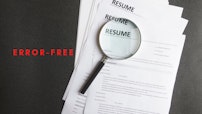Attention to Detail
All products and services featured are independently selected by WikiJob. When you register or purchase through links on this page, we may earn a commission.
- What Is Attention to Detail?
- Why Is Attention to Detail Important at Work?
- Which Jobs Require Attention to Detail?
- Which Skills Improve Your Ability to Pay Attention to Detail?
empty
empty
- How to Demonstrate Attention to Detail on Your Resume
- Strategies for Improving Your Attention to Detail in the Workplace
empty
empty
empty
empty
empty
empty
empty
empty
- Final Thoughts
What Is Attention to Detail?
Attention to detail is a characteristic of the way a person works. It refers to thoroughness, accuracy and focus.
Someone who pays attention to detail produces high-quality work.
A person who pays attention to detail thinks through the fine points of every task, large or small, and does not get distracted when working to complete tasks to a deadline.
They might otherwise be described as meticulous, methodical, diligent or disciplined.
The antithesis of attention to detail is carelessness. Put succinctly, employees who demonstrate attention to detail show that they care about their work.
An employee who values attention to detail doesn’t make mistakes as they foresee them and avoid them by maintaining focus, organizing their time and tasks to ensure they are done to the best of their abilities.
Why Is Attention to Detail Important at Work?
At an organizational level, paying attention to detail minimizes costly errors for companies.
Small mistakes can have a big impact, causing setbacks in projects or ruining client relationships.
So employers are less likely to employ someone who has a track record of carelessness and small mistakes.
This is the case in design, writing, accounting and administrative work.
For example, a grammatical error on a contract or business agreement could leave a company vulnerable to a legal challenge or dispute in the future, costing huge amounts.
Mistakes in administration, for example, omitting to send an important email or arriving at a meeting at the wrong time could damage a company’s reputation or capacity to fulfill contractual agreements with clients.
Numerical mistakes in accounts could cost companies dearly by affecting budgets, reporting and the critical strategic decisions that are made based on these.
Design errors could damage brand image and consumer trust in the long run.
Paying attention to detail will also catalyze your career progression.
If you take responsibility for checking your own work thoroughly and maintaining focus when you carry it out, you will be much more valued than those around you who are distracted and make mistakes.
By working with focus and meticulousness, you reduce the need for your supervisors to waste valuable time and energy checking your work.
In the long run, the work will get done faster and to a higher standard, and you will be trusted with greater responsibilities.
Employees who pay attention to detail will win the trust of their senior managers and progress faster in their careers.
Which Jobs Require Attention to Detail?
Attention to detail is important in most industries, as mistakes in writing, numeric tasks or design tasks could all cost companies further down the line.
It is a particularly important skill for writers, proofreaders or anyone working with contracts, reports or legal jargon.
Paying attention to detail is also important in any job that works with numbers, statistics and spreadsheets – for example, accountancy or business analytics.
Even though spreadsheets do a lot of important number crunching, accountants, bankers and financial professionals still need to be able to check their work using arithmetic.
It is just as important for designers to pay attention to detail.
Once the elements of any design are rendered, they are very difficult to unpick and fix. This is the case in graphic, animated, audio, user experience or system design.
Paying attention to detail is particularly important for freelancers and homeworkers in any industry.
If you are to be trusted to work remotely by an employer or client, they need to know you will deliver mistake-free work within a deadline without supervising you in person.
Which Skills Improve Your Ability to Pay Attention to Detail?
Your ability to pay attention to detail is affected by a few different workplace behaviors. These include:
- How organized you are
- How you manage your time
- Your ability to listen, research, read and work with focus
Organization
The way you organize your working space, your working time and your working routines will all have an impact on how meticulous you are in your work.
Keeping a clean desk and an up-to-date planner, as well as having a paper to-do list, are all important strategies to improve your focus. Keeping your files organized and labeled clearly will also support your ability to complete tasks with attention to detail.
Time Management
Organizing your time to manage your energy will also have an impact on your ability to pay attention to detail.
Planning your day, week and month, and planning to take breaks, will drastically improve your focus and support you in ensuring you avoid making small mistakes that could have large consequences.
Over time, getting into a routine will help you generate the stamina necessary to produce consistently high-quality outputs, so, consciously creating and sticking to a routine is an important factor in paying attention to detail.
Employees who are consistent, considerate and meticulous can focus for long periods and produce mistake-free work confidently, even when under pressure.
Focusing while listening to supervisors or coworkers in conversations or meetings is a key skill. This means giving them eye contact and undivided attention, perhaps even taking notes if that supports your memory.
Being able to focus while reading, analyzing and digesting complex information will inform how much attention to detail you pay when working on a task or project.
Learning to focus takes time and energy and depends very much on your ability to manage your time well.

To find out which jobs fit your personality best, visit our partner CareerFitter and take the Career Test for FREE.
How to Demonstrate Attention to Detail on Your Resume
The first way to demonstrate your attention to detail to a prospective employer is to submit a resume and cover letter that are error-free, neatly presented and appropriately organized.
Attention to detail does not just refer to words and numbers, but also to document layout and consistency in formatting.
All of these add up to a picture of how you approach and present your work, and your resume forms your first impression to your employer of how much attention to detail you pay.
As with any personality trait or working characteristic, it is important to substantiate attention to detail with specific examples if it is a quality you have highlighted on your resume.
Do this by honing in on specific tasks within larger projects where your attention to detail has measurable benefit.
For example, if you spent extra time proofreading, checking and editing a report or copywriting project, find a way to show, with a statistic, how this made an impact on the process or outcome.
If you are applying for a job where proficiency with numbers or spreadsheets will require great attention to detail, give examples of times your diligence in one of these areas directly benefited the outcome of a project.
In a design role, you can demonstrate your attention to detail and meticulous approach through a portfolio.
On your resume, direct the reader to particular projects in your portfolio that demonstrate diligence or may have required extra focus and attention to complete to a high standard or within a tight timeframe.
Paying attention to detail is an important factor in building trust with your teammates and supporting them to ensure their work is also high quality.
Cite examples on your resume of times where your attention to detail has allowed you to check, improve and build upon the work of others in your team.
Strategies for Improving Your Attention to Detail in the Workplace
Check, Check and Check Again
Get into the habit of checking your work.
Although you may be confident in your professional abilities, get into the habit of triple-checking your work before you hand it over. Otherwise, it is the starting point of sloppiness and the gateway to guaranteed mistakes.
It is possible to create a checking routine, which will help you read for mistakes faster and with more accuracy.
For example, if you are checking written work, reading through a document once for grammar, once for spelling and once for punctuation.
By creating a routine, you will sharpen your eye for mistakes and greatly improve the overall quality of the work by refining the details.
You can also use digital tools such as spell checkers to proof your work, but it is important not to rely on these entirely for quality control.
Good employees can check their work with rigor, without the support of technology.
Put It on Paper
For some people, proofing work on screen is not as effective as proofing work on paper.
Printing documents to proofread them may help you spot mistakes, or simply see them in a different light, to identify new ways to improve their quality.
Similarly, if using to-do lists, it can be more effective to keep these on paper rather than on a digital device, so they are visible and accessible to the side of your computer.
Tidy Up
Keeping your workspace clear, quiet and tidy will greatly affect your ability to focus and therefore pay attention to detail.
Keep your deskspace or office free of junk, and keep the tools you need for your work to hand, so you are not distracted by looking for resources during your working day.
Organize
Organize your time carefully and ensure you keep an up-to-date schedule. This will ensure you arrive at meetings on time and use the remaining time to meet deadlines without rushing your work and making mistakes.
Planning appropriate work breaks is an important factor in improving your focus and attention to detail.
Be aware of your stamina level, and chunk up your time according to your needs. If you can maintain focus on a project for an average of 30 minutes, for example, plan a short break every half hour.
Set aside regular chunks of time for checking your work, so you can maintain a high level of attention to detail.
Start a Routine
Designing, iterating and embedding a routine into your working life is a powerful strategy for improving productivity.
This is because, if a decision is made in advance, such as whether to check your email or update your calendar first thing each morning, it eventually becomes a habit, making space in your time and your conscious thought processes to focus on the quality of your work.
Using, and continually improving on, a routine can help you manage energy levels to ensure you stay focused enough to pay real attention to detail and complete work with ample time to check it before it is handed on.
Switch Off Your Phone
Keeping your communication separate from your workspace will seriously affect your ability to focus and will train you to give your full attention to all the tasks you carry out in your workplace.
Digital devices are designed to consume our attention – so placing your device out of sight will help to improve your ability to focus on small details when checking, proofing, listening to or analyzing information.
Improve Your Focus Through Meditation and Games
Meditation has been proven to support all sorts of mental faculties, but it is particularly helpful in improving your ability to pay attention to detail.
Essentially, meditation is a way of practicing maintaining focus, gradually increasing the length of time you can place attention on an object or thought process.
You can use apps to learn to meditate, but if it isn’t for you, exercising regularly is another means of improving your ability to focus and pay attention.
Using online games and puzzles to improve memory, focus and recall is another great way to sharpen your mind and ensure you can work with an impressive level of diligence.
Make Quality a Priority
Essentially, a person who pays attention to detail produces high-quality work. Attempting to produce more work, instead of better work, within a given time frame will result in mistakes.
Instead, making quality a considered priority will ensure you pay attention to detail.
Arriving at work to produce the highest quality output possible will drive you to pay better attention to the details of what you are doing.
Final Thoughts
Attention to detail may seem like a cliché catchphrase, but it is essential to the success of any project.
An employee who makes small mistakes is creating work for someone else to correct, slowing progress, building frustration and damaging a company’s reputation.
From visual design to statistical modelling, being close enough is simply not an option.
For your career progression, ensure you are paying attention to detail in all aspects of your work.
Consider how focusing on quality in the way you analyse, present, organize and deliver projects will benefit your work and the work of everyone around you.



